Transport of animals is the weak link in the chain
Wed, 14 March 2012
Category: Media: conferences and press
Animal rights groups are targeting transport companies involved in the supply of animals to laboratories in Europe and North America. The strategy has led to Air Canada and China Southern Airlines agreeing to stop carrying animals for research

Coverage has appeared in the UK and US today on the growing problem of animal rights groups that are targeting transport companies involved in the supply of animals to laboratories in Europe and North America. The strategy – which has been employed by various quarters of the animal rights movement for more than a decade – has enjoyed remarkable success in recent months, with Air Canada and China Southern Airlines becoming the latest in a long list of airlines that have agreed to stop carrying animals for research.
The British newspaper The Times led with the story, quoting key representatives from the UK biomedical research sector as well as from transport companies, trade associations and government. Former UK Science Minister Lord Drayson said that as an island, Britain was particularly vulnerable to the threat: “The extremists have been very clever at identifying weak links in the chain," he said.
Compared with contract research companies or animal breeders, airlines have proved much less resilient to pressure from animal rights groups. Most have agreed to protestors’ demands after intense but lawful letter, phone and email campaigns. Air France-KLM – the last major airline company still willing to carry research animals – has been the focus of escalating activity, some of which has been illegal. Citing the company’s continued involvement in the supply of laboratory animals, extremists dug up several greens at the Hilversumsche golf club in the Netherlands in September last year, delaying the start of the KLM Open.
Other major carriers have long since pulled out of the business. British Airways announced a ban on transporting animals for research in May 2005 after a campaign during which several top officials were targeted by extremists. BA said at the time that carrying such animals was not part of its core business.
As the number of airlines willing to fly research animals has fallen sharply, shipping firms have moved in. These too have been targeted. Under pressure from the UK’s National Anti-Vivisection Alliance (NAVA) – the leader of which is a known extremist currently in jail awaiting trial – P&O Ferries, Stena Lines and Transeuropa Ferries have all agreed to end their involvement in the transport of laboratory animals.
Speaking to The Times, a P&O spokesman said: “Those of us in the industry with long memories remember when the anti-transportation of livestock campaign got into full swing. On one occasion a letter bomb exploded in the face of a secretary at Stena. We recognise that this trade is perfectly legal. On the other hand we have our reputation to think of, as well as the safety of our employees.”
It seems that based on past experience, the implicit threat of extremism is proving sufficient to force a large number of companies to capitulate. Whether or not this fear is misplaced, until these firms are confident enough in the laws – and the law enforcement – in place to protect them and their reputations, they will continue to give in to activists’ demands.
